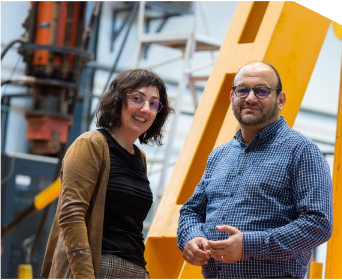The work of the Research Chair II renewed by EDYCEM and Centrale Nantes is focused on materials capable of meeting the challenges of the city of tomorrow, in particular by reducing the impact of new buildings on the environment and taking into account the all emissions over its life cycle, from its construction.
The land at the heart of R&D
The pioneering synergies between EDYCEM and CENTRALE NANTES have continued to grow since the start of their collaboration in 2001 to innovate and thus expand the range of products and services dedicated to concrete professionals. In 2015, their Research Chair I on “Innovative concretes for new applications”, which aimed to strengthen R&D, saw the birth of innovative achievements such as the first connected concrete SMARTCEM® or the eco-responsible concept EDY’ECO . Building on these twenty years of collaboration, the two players launched the Research Chair II at the end of 2019, called “Responsible concrete serving the environment”, for a period of five years. EDYCEM remains today the only mid-sized company in France to have signed a research chair with a CNRS-labeled laboratory with international influence.
The program of this Research Chair II, with an investment of 3M €, confirms EDYCEM’s commitment to an innovation approach focused on societal issues. The work is focused on materials capable of meeting the challenges of the city of tomorrow, in particular by reducing the impact of new buildings on the environment and by taking into account all emissions over its life cycle, from its construction. .
The subjects to be discussed are a continuation of previous work, to create concrete and construction processes that contribute to environmental challenges. Each material is studied in depth using advanced experimental and digital techniques, leading to the continuous improvement of products and the development of innovations such as the structural insulating concrete TECHNILISS © which is the subject of a patent. EDYCEM’s dynamic is fueled both by societal issues and by the concrete expectations of its customers. It includes in the program, for the first time, two companies from the West and the Technical Association of the Hydraulic Binders Industry (ATILH), which will enrich the academic contributions by their industrial vision:
- CHARIER, a family-owned public works company with expertise in aggregate extraction, road works, earthworks, deconstruction and civil engineering …,
- ATILH, represented by several professional organizations and members of La Filière Béton,
- ROTURIER SAS, specializing in hydraulic civil engineering (wastewater treatment plants, engineering structures, bridges, etc.) and structural works (industrial buildings, functional structures and civil engineering (wind power, methanization, engineering structures).
Thinking about the city of tomorrow
The Research Chair II consists of three new theses which will focus on sustainable development issues and the climate challenges of tomorrow :
- low carbon concrete : the behavior and performance of concretes are analyzed with the new cements which will be incorporated into standard NF EN197-1. For example, CEM II / CM, the clinker content of which varies between 50 and 64%. This subject will allow anticipate future regulations by understanding the structured and differed biological behaviors of matter. To carry out this work, EDYCEM relies on ATILH, one of the objectives of which is to help reduce the carbon footprint of cement. Its missions, linked to environmental issues, the standard and the quality of cements, make it a benchmark partner in the development of low-carbon concrete.
- optimization of the formulation of drainage pavements for roads. This line of research has a dual objective. The first is from limit urban heat islands (UHI), at the origin of health risks for populations, by designing materials resulting from deconstruction with an evapotranspiration property.
The second application is positioned in a context of sustained rains over short periods which often generate localized flooding, and serious material and human damage. A phenomenon due to the high impermeability of the roadways. The aim of the work is to offer formulations of road concrete that are sufficiently permeable and durable in order to quickly evacuate the runoff water.
- durability of concrete in water treatment plants. Chemically aggressive environments can lead to rapid structural degradation if concrete has not been specifically designed for this use. Depending on the process and the composition of the treated water, these environments bring into play several degradation mechanisms. How to reconcile workability, durability, and structural behavior of concrete in hydraulic structures? This thesis aims to reproduce environments in order to study concrete formulations. A performancial approach will be implemented to ensure the sustainability of the structures.
Like the Research Chair I, the results of the work carried out may be the subject of publications in specialized international scientific journals or conferences in France and abroad. A pledge of recognition of the quality and reliability of the approach.
–

:quality(85)//cloudfront-us-east-1.images.arcpublishing.com/infobae/WJJZUA2VUNFX7CF4UKXOZHUV24.jpg?resize=150%2C150&ssl=1)
